CASE FILE | |
| Location: | Cambodia, Ratanakiri Provence |
| Project: | Rubber and fruit tree plantations |
| Companies: | Hoang Anh Gia Lai (HAGL), HAGL Agrico, Heng Brothers, CRD and Hoang Anh Oyadav |
| Key concerns:
| · Violation of the right to self-determination · Forced displacement, land grabbing and alienation from customary land used for traditional agricultural practices · Destruction of forests, crops and other productive resources · Destruction of water resources · Destruction of burial grounds, spirit mountains and other sacred sites |
| Community goals: | Return of land, forest, and water rehabilitation and compensation for damages |
| Key investors, financiers and directly linked companies: | International Finance Corporation via its financial intermediaries TP Bank and VP Bank; Mr. Duc Nguyen; Truong Hai Auto Corporation (majority shareholder of HAGL Agrico) and its business partners Peugeot, BMW, Kia and Mazda; Van Eck Associates; Lion Global Investors; State Street Global Investors |
| Our partners: | Equitable Cambodia, Highlanders Association and Indigenous Rights Active Members (IRAM) |
Ratanakiri’s once abundant forests have been decimated over recent years as a staggering number of large-scale land concessions have been granted to logging and agribusiness companies, primarily for rubber plantations.
With landholdings covering an estimated 5 percent of the province and overlapping with vast tracts of Indigenous community land, Vietnamese company Hoang Anh Gia Lai (HAGL) has been responsible for a litany of harms against local communities, amounting to a wholesale assault on their way of life. This has included the illegal seizure of community agricultural land and crops; clear-cutting of forests, including resin trees and other non-timber forest products that communities relied upon for their food, medicine and livelihoods; destruction of religiously significant sacred sites, such as spirit mountains and burial grounds; and considerable damage to community water resources and fisheries.
Since 2014, Inclusive Development International has been working alongside local partners to help the Jarai, Kachok, Tampuon, and Kreung communities defend their rights in the face of these serious violations.
In its 2013 report Rubber Barons, Global Witness identified that an early investor in HAGL was a Vietnamese private equity fund in which the World Bank’s private sector arm, the International Finance Corporation (IFC), held an equity stake. It was clear that the IFC had failed to do its due diligence on this high-risk investment and monitor where its money was ending up.
After the report came out, we conducted an awareness campaign throughout the affected communities and then assisted 14 villages to file a complaint to the IFC’s independent accountability mechanism, the Compliance Advisor Ombudsman (CAO).
The complaint led HAGL to engage in off-and-on negotiations with the communities through a dispute resolution process facilitated by the CAO. We have accompanied the communities throughout this protracted and often turbulent process, helping them to gain leverage in their struggle from the investors, financiers and other companies that are directly linked to HAGL’s operations.
This advocacy has resulted in a significant reduction in the company’s land concessions in Ratanakiri– sparing two of the 14 villages from land grabs and preventing more than 10,000 hectares of forests from being cleared. It has also led to a commitment to return jointly demarcated sacred areas to the communities, though this land return has yet to be fully effectuated by the Cambodian government.
We continue to support the communities in their quest for a full and comprehensive remediation agreement with the company. Subscribe to our mailing list to stay up to date with this and other cases.
Our further investigations revealed a number of high-profile investors, including Credit Suisse, Deutsche Bank, and several investment funds. We confirmed IFC’s exposure to HAGL’s harmful investments in Cambodia through its equity holding in Dragon Capital, an investment fund that held shares in HAGL. These financial relationships meant that IFC’s environmental and social standards, including those relating to Indigenous peoples, land and natural resources, should have been applied to HAGL’s business operations in Cambodia. It also meant that the affected communities were entitled to file a formal complaint to the IFC’s independent accountability mechanism, the Compliance Advisor Ombudsman (CAO).
We conducted an awareness raising campaign to inform the affected communities about these findings and advocacy opportunities through workshops with community leaders and videos produced in four Indigenous languages. In 2014, the communities decided that they wanted to file a complaint to the CAO and we assisted them to do so.
Inclusive Development International, along with Equitable Cambodia and two Ratanakiri-based Indigenous peoples organizations, supported representatives of 14 villages containing some 15,000 people to file a complaint requesting the Ombudsman to facilitate a mediation process with the company to address their grievances related to the taking of their land and destruction of natural resources.
We conducted a human rights impact assessment in order to clearly identify the impacts of the concessions on the local communities, as well as a detailed land mapping and inventory of damages. These documents provided an evidence base to bolster the communities’ claims for redress through the mediation process.
Filing the complaint to the CAO, coupled with media attention, resulted in HAGL’s commitment to enter into a mediation process with the communities. When this commitment waivered, additional pressure resulting from investor advocacy steered the company back to the table. Meanwhile, as the public profile of the case grew, and quiet efforts were made to engage key government officials and convince them of the benefits of constructively engaging in the process to resolve a high-profile land rights case, important government officials gradually bought in to the process.
In a major breakthrough in the mediations, in September 2015, the company acknowledged that it had “made mistakes” and it issued a formal apology to the affected communities. It committed to refrain from any further expansion of its plantations and to return all the land in its Hoang Anh O Yadao, CRD and Heng Brothers concessions that it had not yet planted. This resulted in the official reduction of three concessions by over 55 percent, preventing more than 10,500 hectares of Indigenous customary land and forests from being privatized and transformed into industrial mono-crop plantations. This reduction also meant that 2 of the 14 villages now fall outside the concession boundaries.
The company also agreed to a joint land mapping process, involving community representatives and NGO advisors, the CAO, the company and the competent authorities, to demarcate the boundaries of HAGL’s plantations and the communities’ land claims. HAGL committed to offering compensation or returning any areas of land that it had cleared and developed if it was ascertained through this process that the land belonged to the communities. The company further agreed to repair and maintain community access roads, bridges and other infrastructure that was damaged by its operations and to restore all water sources and fisheries that were affected. Finally, the company agreed to support the communities in securing title to their land.
The process stalled for a considerable period of time when the company faced a serious financial crisis, but it returned to the dialogue in April 2017 and made specific commitments to return several spirit mountains to the communities. The provincial government of Ratanakiri formalized its role in the CAO process by appointing a working group to support the implementation of agreements reached between the parties, including the demarcation of land parcels that would be excised from the concession and returned to the communities.
Between November 2017 and May 2018, an intensive land demarcation process was carried out, involving the community, company, government officials and NGO advisers hiking vast areas to conduct joint-assessments of community land claims and recording GPS coordinates of boundaries, features and rights of way.
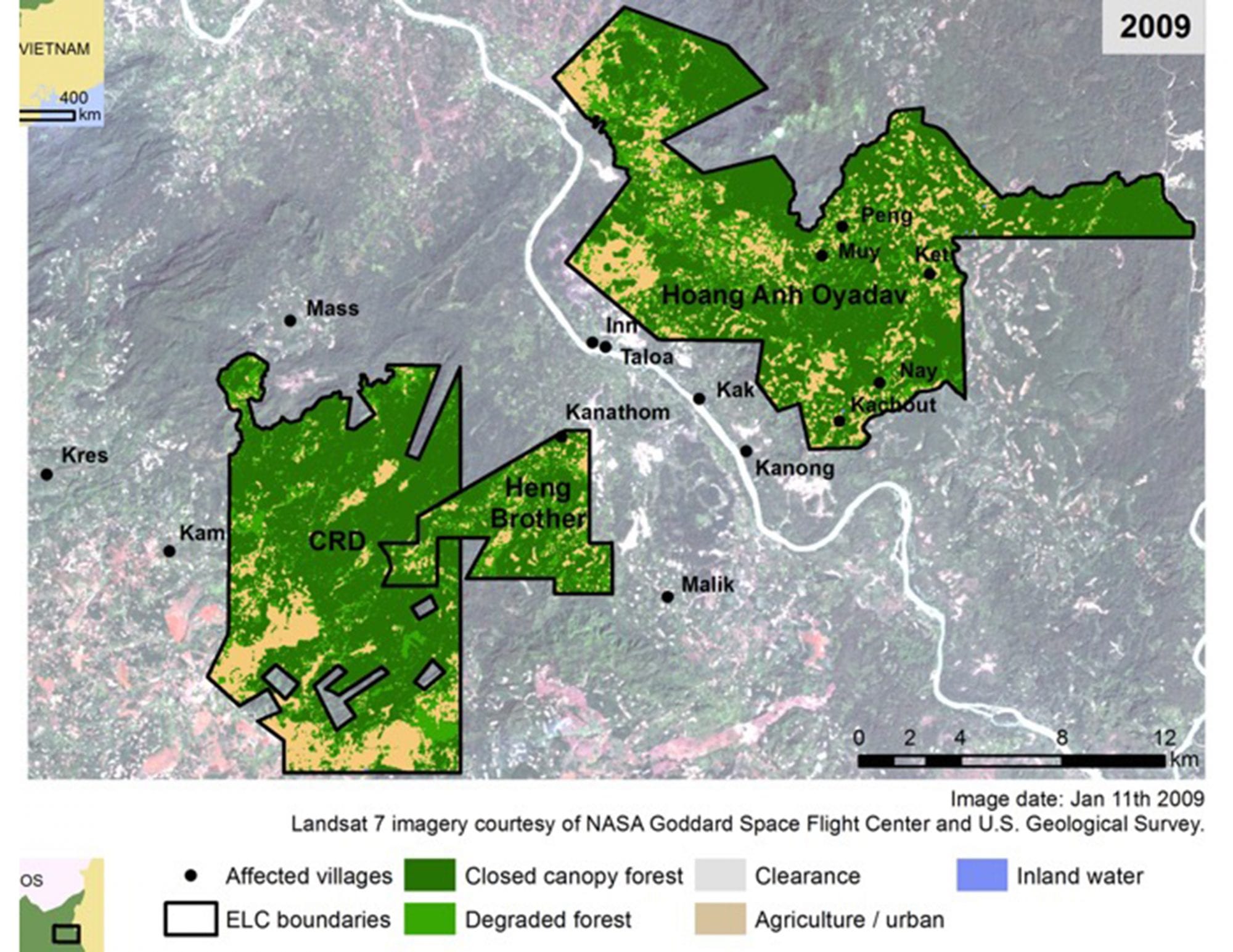
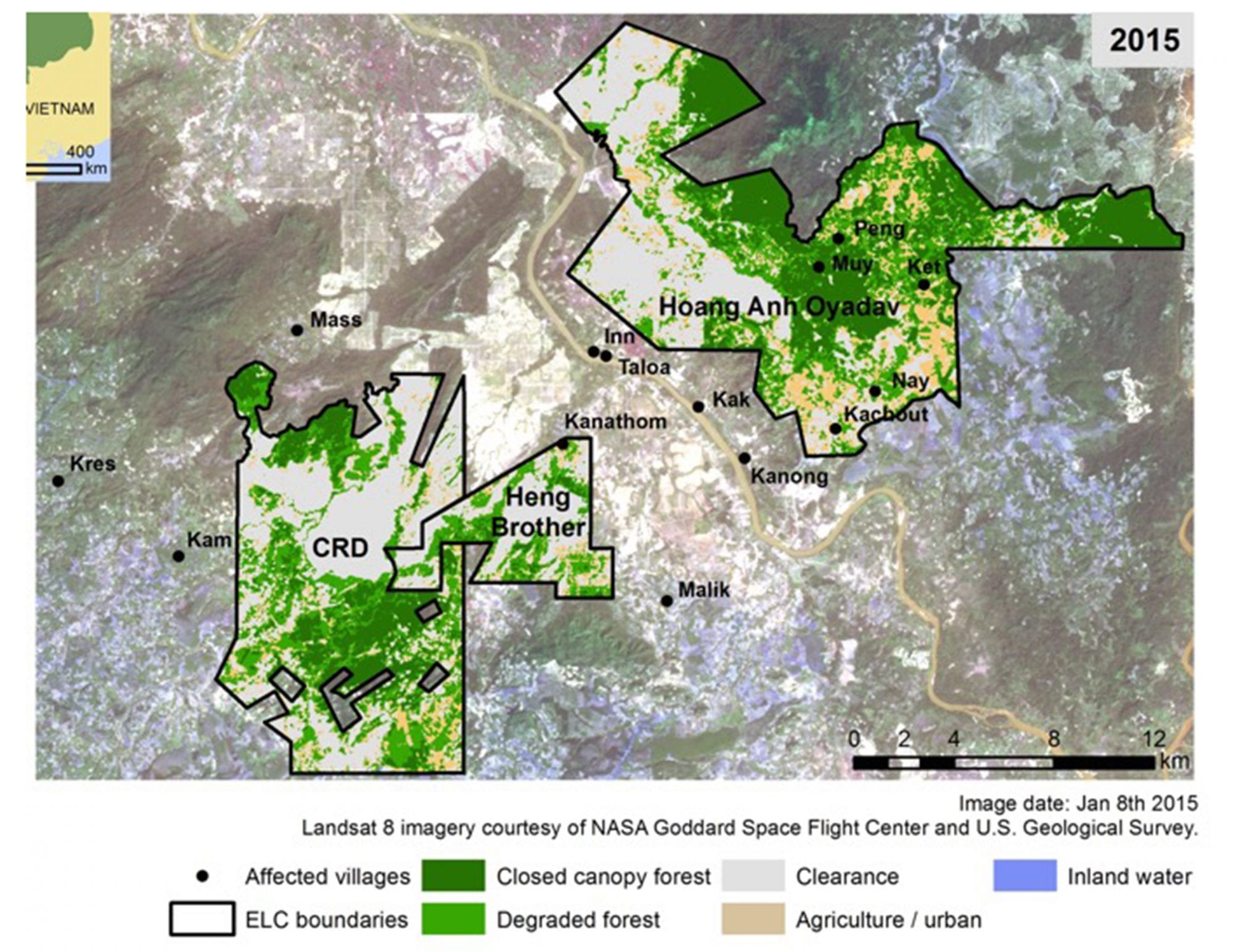
Inclusive Development International and our local partners assisted the community to prepare for and participate in the joint mapping exercise, and to push for recognition of their claims in the mediations. We held workshops and trainings where community members learned about their tenure options, customary land registration, participated in geographic information system (GIS) mapping exercises, and conducted a valuation of their losses.
At the conclusion of the demarcation process, HAGL agreed to return 20 spirit mountains and two burial grounds to the villages. But the communities demanded the return of all 64 areas that were demarcated, including spirit mountains, burial grounds, chrops (wetlands) and chraps (hunting areas) that the company had already planted with rubber and fruit trees. Where agreement between the parties could not be reached, it was resolved that the Cambodian government would make a final decision.
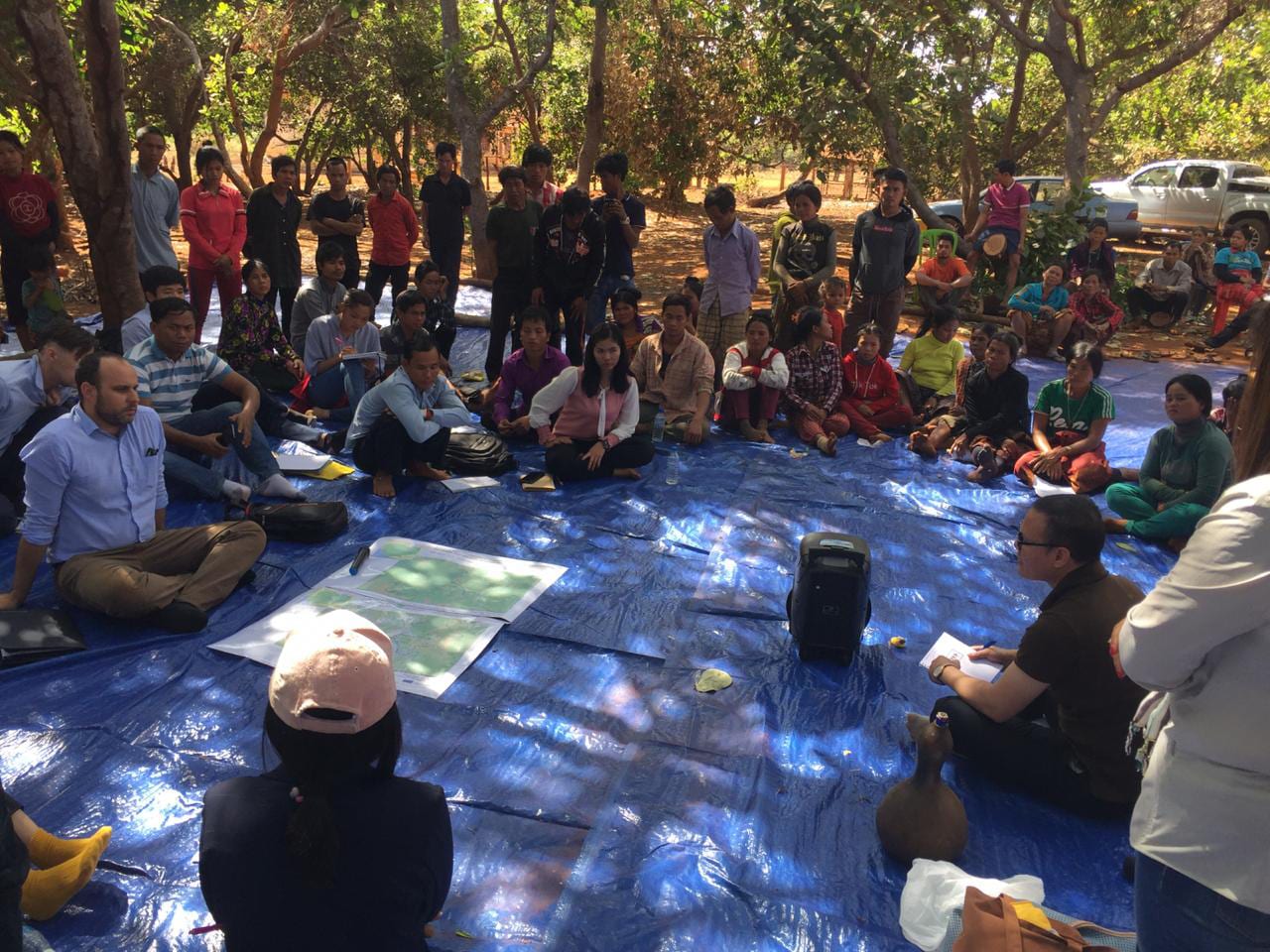
On March 26, 2019, the governor of Ratanakiri convened a gathering in the provincial capital of Banlung and announced that all 64 demarcated areas, totalling 742 hectares, would be cut out of the HAGL concessions and returned to the communities “for the indigenous people to practice their beliefs, cultural traditions and to support their livelihoods.”
HAGL responded by pulling out of the mediations, before reaching a final agreement with the communities on land and water rehabilitation and compensation for damages.
In response to this unilateral withdrawal, Inclusive Development International and our partners Equitable Cambodia and Highlanders Association supported the communities to file a second complaint to the CAO, citing new financial ties between the IFC and HAGL.
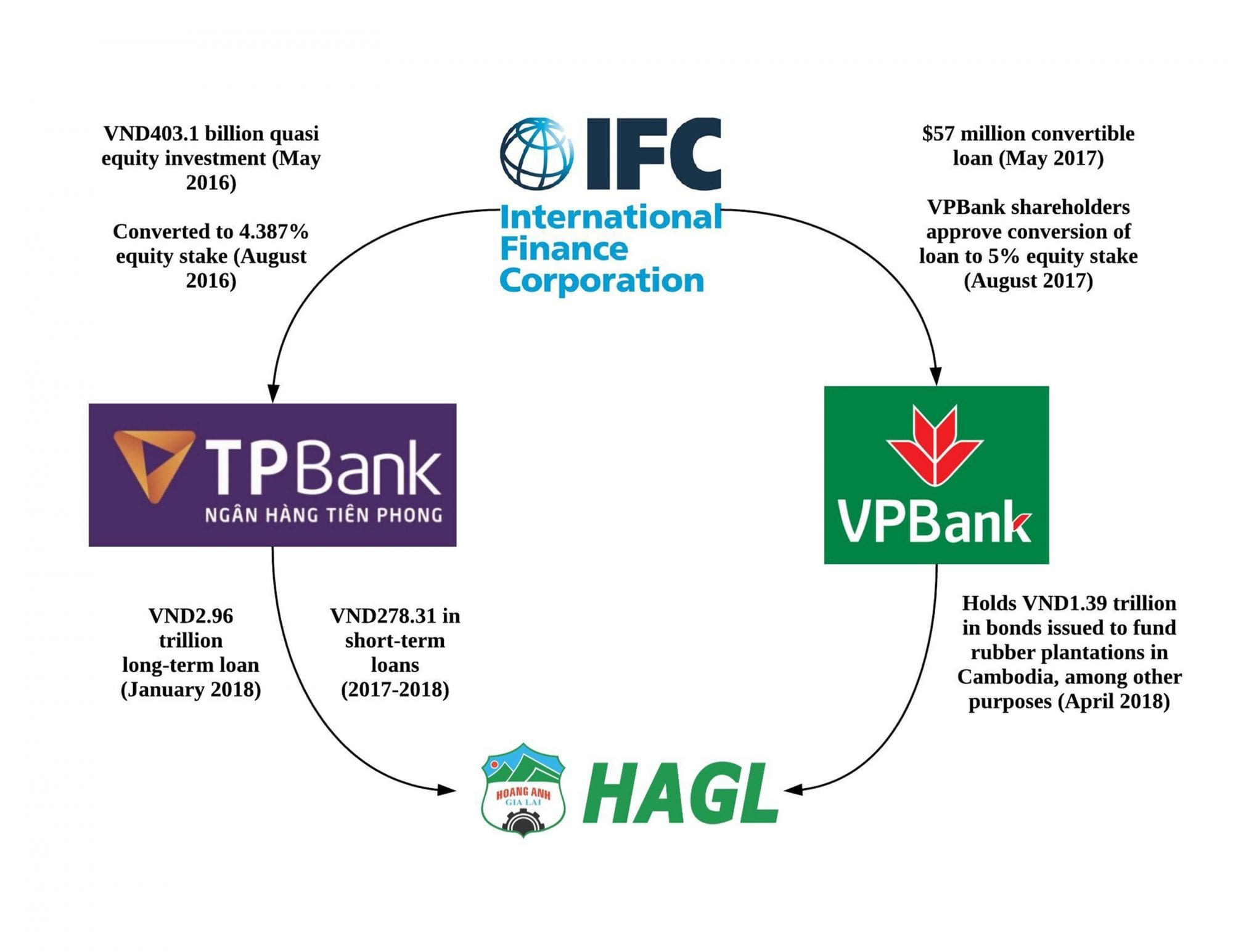
The complaint provided extensive evidence of HAGL’s breaches of IFC’s environmental and social Performance Standards resulting from its destruction of forests, waterways, pastures, orchards, spirit mountains, burial grounds and other sacred areas belonging to Indigenous communities in Ratanakiri.
HAGL agreed to return to the mediation process with the communities. However, in March 2020, in a stunning act of bad faith, the company cleared large areas of land that had been earmarked for return to the communities through the government-led demarcation process. The majority of this land was cleared while the indigenous communities were sheltering in place to protect against the spread of COVID-19.
We continue to support the communities’ public demands that HAGL cease land clearances immediately, return the communities’ land as promised, and provide restitution for all the damage it has caused.
Chief among the companies that have benefited from these concessions is Vietnamese agribusiness giant Hoang Anh Gia Lai (HAGL), whose subsidiaries received more than 47,000 hectares of land in Cambodia, despite the legal limit of 10,000 hectares per company. Three of HAGL’s wholly-owned subsidiaries were granted more than 20,000 hectares of land in Ratanakiri province for rubber plantations. Much of this land fell within the territories of the region’s Indigenous communities, including Jarai, Tampoun, Kachok and Kreoung villages.
The government and company both failed to consult the affected communities and to seek their free, prior and informed consent for the granting of the concessions and the plantation development, which affected their lands, territories and natural resources. In most cases, the first time that the communities learned about the concessions was when the company’s bulldozers arrived and began clearing their land. At every stage, from preparation to approval to implementation, the legal and regulatory framework was violated by the company and the state actors that facilitated the project.
At least 14 villages with a population of some 15,000 people were affected by HAGL’s concessions, mostly between 2010-2013. All but two of these villages had already suffered losses of both a communal and household nature. Communal losses included collectively held and used lands, including community forest, grazing land, reserved land for future generations and shifting cultivation, spirit forest, chrops, chraps and burial grounds; access to resin and other non-timber forest products, and wildlife; and access to and pollution of water sources and fish resources. Household losses included rice fields and orchard/farming land and crops including rice, cashew, cassava and a variety of fruit trees.
The extensive loss of critical natural resources has had a severe impact on livelihoods. It has led to a decrease in income and in some cases significant reductions in quality, diversity and quantity of food consumption. Communities that relied heavily on natural resources as a food source were forced to purchase more food from the market, but often could not afford to do so. Women reported deteriorating physical and mental health, with new feelings of anxiety over family livelihoods. Some villagers who previously used traditional medicines were finding it harder to access them due to the destruction of forest. Resin, a main source of energy and income for some villagers, has been badly depleted.
Religious and cultural practices of the communities were also seriously impeded by the loss of spirit forests and burial grounds. These losses affected some communities’ ability to conduct ceremonies, including those that facilitate intra-community dispute resolution, which has in turn affected community cohesion. The communities believe that the destruction of forest and natural resources has angered the spirits, causing them considerable anxiety. Their cultural identity has been further jeopardized by the rapid and mass introduction of migrant workers of Khmer ethnicity with a starkly different culture, which has begun to influence their own behavior.
The loss of reserved land for future generations and for practicing shifting cultivation, their traditional form of agriculture, has seriously eroded the communities’ sovereignty over their land and system of food production and consumption, which is deeply interconnected with their identity and way of life.
No compensation was provided for communal losses. In some cases households received compensation for lost rice fields and farming land, but in all such cases the amount of compensation received was inadequate and accepted under duress after being told they would otherwise receive nothing. As one villager described it, “The benefits the community received from the company were even smaller than a nail. We could produce three to four tons of rice on a hectare of land per year but what we received from the company [for taking the land] was a total of 50 kilograms of rice per household.”
In March 2020, HAGL defied the mediation agreement it reached with communities and carried out sweeping clearances of land that had been earmarked for return to the communities through the demarcation process. The majority of this land was cleared while the communities were sheltering in place to protect against the spread of COVID-19. The areas HAGL cleared in March were among those areas designated for return to Muoy, Inn, Mas and Kak villages. While the communities waited for the official ratification of this land return by the Agriculture Ministry, which had been delayed due to COVID-19, the company bulldozed two spirit mountains, wetlands, traditional hunting areas and burial grounds. The clearances destroyed forests and caused irreparable harm to land of priceless spiritual value to the communities. This experience only strengthened the communities’ resolve to hold HAGL and its financiers to account.
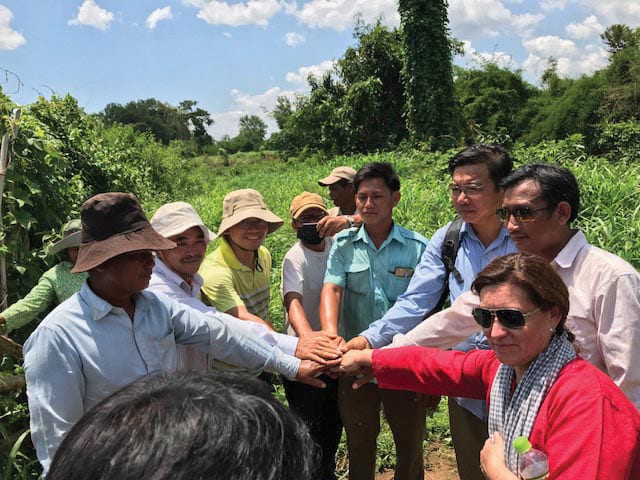
Ratanakiri Families reach ‘major breakthrough’ with firm — The Cambodia Daily — September 21, 2015
Sexual abuse among claims against HAGL — The Phnom Penh Post — May 14, 2014
Rubber Company Suspends Projects as World Bank Investigates — Voice of America (VOA) — May 6, 2014
IFC Accepts Complaint Over Ratanakkiri Rubber Plantations — The Cambodia Daily — February 26, 2014
Rubber fallout extends to IFC — The Phnom Penh Post — February 11, 2014
Minorities Complain to IFC Over Rubber Farm Funding — The Cambodia Daily — February 11, 2014
Deutsche Bank and IFC accused of bankrolling Vietnam firms' land grabs — The Guardian — May 12, 2013
Hey, you seem interested in our work. Why not sign up to our mailing list for occasional updates, alerts and actions?